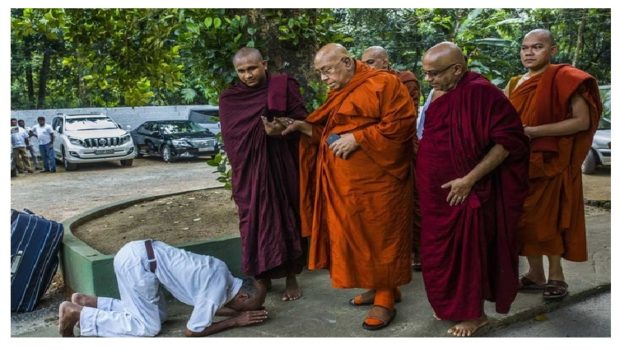
Sri Lankan monks rise up against 20A
PTI, Oct 12, 2020, 9:28 PM IST

Colombo: A section of Sri Lanka’s politically influential Buddhist clergy on Monday came out strongly against the government’s proposed 20th Amendment to the Constitution that aims to bolster the powers of the President.
The government on September 2 gazetted 20A, the new proposed legislation that would replace the 19th Amendment introduced in 2015 that curtailed the powers of the president and strengthened the role of Parliament.
The Amarapura and Ramanna sects of monks, in a joint statement, said that the proposed 20A would destroy the independence of the judiciary, the public service, the system of elections while undermining the independence of Parliament and members of Parliament individually.
The joint sects assert that what is needed now is not 20A to reverse the 2015 adopted 19A, but action to formulate a new Constitution by fixing any weaknesses in 19A.
The two sects, however, have less influence than the main sects based in the central town of Kandy.
The statement came after a leaked document over the weekend on the Supreme Court’s determination on the constitutionality of 20A.
Media reports said that the highest court had ruled that four of the 20A’s clauses need to be approved at a referendum by people in addition to the two thirds parliamentary majority.
The clauses, which restores presidential immunity and the presidential power to dissolve Parliament after a year even though the parliamentary term is five years are the ones which needed a referendum, the reports said.
The official document on the apex court’s determination is to be only made public on October 20 by parliamentary speaker.
A five-member bench of the Supreme Court had heard some 39 petitions filed by the main Opposition and a host of others.
All petitions took the common ground that the 20A if enacted by repealing the 19A, would impinge on the fundamental rights of the citizens.
The 20A ignited some protests from within the ranks of the ruling SLPP.
The government chose to allay their fears by saying that amendments would be moved at the committee stage of the debate.
The government sources said that the amendment would be duly enacted in Parliament before the November 17 when the 2021 budget is scheduled to be presented.
The 20A is meant to annul the 19A which was seen as a pro-democracy, good governance amendment which called for checks and balances in the presidential system while making Parliament more powerful.
The 19A was seen as the most progressive pro-democracy reformist move since Sri Lanka came to be governed under the all-powerful executive presidency in 1978.
The 20th Amendment proposes to restore full legal immunity to the President, removing the provisions made in the 19A to take legal action against the President.
President Gotabaya Rajapaksa was elected with a mandate to abolish the 19A.
During the last November’s presidential elections and last month’s parliamentary elections, Rajapaksa said that the 19A had made governance difficult as it created a rift between the executive president and prime minister.
Udayavani is now on Telegram. Click here to join our channel and stay updated with the latest news.
Top News

Related Articles More

India & Kuwait elevate ties to strategic level; ink defence pact after PM Modi meets top Kuwaiti leaders

In Kuwait, PM Modi meets yoga practitioner, other influencers from Gulf country

PM Modi receives Kuwait’s highest honour

PM Modi in Kuwait meets translator, publisher of Mahabharata, Ramayana in Arabic

Indian manpower, skills will help build ‘New Kuwait’: PM Modi
MUST WATCH
Latest Additions

Kannada Sahitya Sammelana: Food distribution creates stir

Rohit gets hit in nets, practice pitches on slower side

India & Kuwait elevate ties to strategic level; ink defence pact after PM Modi meets top Kuwaiti leaders

In Kuwait, PM Modi meets yoga practitioner, other influencers from Gulf country

Notorious gangster wanted in UAPA case arrested at Nepal border
Thanks for visiting Udayavani
You seem to have an Ad Blocker on.
To continue reading, please turn it off or whitelist Udayavani.

















